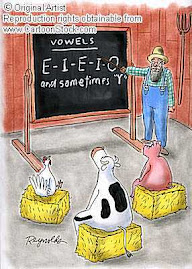RAIN RELATED VOCABULARY
and a very very creative video to watch
but especially to listen to.
For the full effect, CLOSE YOUR EYES!!
There are tons
of ways to express the fact that there is moisture in the air in English,
whether it be rain, snow, sleet, hail, humidity, etc. It seems there are even
more ways to describe the types of rain alone that we experience. Is it
showery, rainy, drizzling, or what out there? If one doesn't speak English as a
first language, differentiating between the various types of rain can be a bit
daunting.
Rain vocabulary
seems to revolve around whether the rain is coming down a lot, a little, or
somewhere in between the two.
Some rain-related phrases and words
that are helpful for English language learners
to know are:
drizzle/drizzling thunderstorm flood out
flood showery/shower
raining cats
and dogs downpour heavens opening heavy/light rain
soft/hard rain
An activity to
help explain the different types of rain one might experience is to watch this video where people make
the sounds of rain with their bodies. They proceed through the various stages
of a rainstorm from beginning to end. You can identify what type of rain you
think each section of the presentation is representing. Can you imitate the
sounds to represent the words that recreate the "drizzle, "showery,"
"downpour," and "heavy/light" rain.
If you feel like
it you can write a short text, a writing activity where you can re-use the
vocabulary to describe your favorite type of rain, or perhaps to tell a
personal narrative (anecdote) about a time you were caught in the rain. Then
you can send it to me and I will correct it.
Ironically I have the time…
Because it is raining all the time
and there is nowhere to go!!!’
Have a great day… malgré tout!
SUZANNE












.jpg)
No comments:
Post a Comment